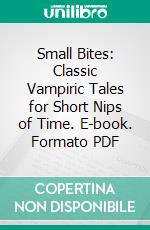Happy Castaways: Golden Age Space Opera Tales. E-book. Formato PDF - 9791220265812
di S. H. Marpel
edito da MIDWEST JOURNAL PRESS , 2021
Formato: PDF - Protezione: nessuna
Castaway!
A word that has meant dire warning and inevitable doom through sea faring tales - and now space-faring ones.
Or does it?
Golden Age Space Opera has traditionally ended up with happy endings - or at least, non-tragic.
This anthology of stories concerning castaways in outer space, in times that haven't happened (yet) has that one element in common. Someone wound up marooned and had to make the best of it.
Perfect for settling back in an easy chair, couch, or bed on a solitary evening with only your imagination for company. Or, with these short stories, just being able to escape by yourself for awhile in the midst of our too-crowded modern lives...
Space Opera is a subgenre of science fiction that emphasizes space warfare, melodramatic adventure, interplanetary battles, chivalric romance, and risk-taking. Set mainly or entirely in outer space, it usually involves conflict between opponents possessing advanced abilities, futuristic weapons, and other sophisticated technology.
The term has no relation to music, as in a traditional opera, but is instead a play on the terms "soap opera", a melodramatic television series, and "horse opera", which was coined during the 1930s to indicate a formulaic Western movie. Space operas emerged in the 1930s and continue to be produced in literature, film, comics, television, and video games.
The Golden Age of Pulp Magazine Fiction derives from pulp magazines (often referred to as "the pulps") as they were inexpensive fiction magazines that were published from 1896 to the late 1950s. The term pulp derives from the cheap wood pulp paper on which the magazines were printed. In contrast, magazines printed on higher-quality paper were called "glossies" or "slicks".
The pulps gave rise to the term pulp fiction. Pulps were the successors to the penny dreadfuls, dime novels, and short-fiction magazines of the 19th century. Although many writers wrote for pulps, the magazines were proving grounds for those authors like Robert Heinlein, Louis LaMour, "Max Brand", Ray Bradbury, Philip K. Dick, and many others. The best writers moved onto longer fiction required by paperback publishers. Many of these authors have never been out of print, even long after their passing.
Anthology containing:
A word that has meant dire warning and inevitable doom through sea faring tales - and now space-faring ones.
Or does it?
Golden Age Space Opera has traditionally ended up with happy endings - or at least, non-tragic.
This anthology of stories concerning castaways in outer space, in times that haven't happened (yet) has that one element in common. Someone wound up marooned and had to make the best of it.
Perfect for settling back in an easy chair, couch, or bed on a solitary evening with only your imagination for company. Or, with these short stories, just being able to escape by yourself for awhile in the midst of our too-crowded modern lives...
Space Opera is a subgenre of science fiction that emphasizes space warfare, melodramatic adventure, interplanetary battles, chivalric romance, and risk-taking. Set mainly or entirely in outer space, it usually involves conflict between opponents possessing advanced abilities, futuristic weapons, and other sophisticated technology.
The term has no relation to music, as in a traditional opera, but is instead a play on the terms "soap opera", a melodramatic television series, and "horse opera", which was coined during the 1930s to indicate a formulaic Western movie. Space operas emerged in the 1930s and continue to be produced in literature, film, comics, television, and video games.
The Golden Age of Pulp Magazine Fiction derives from pulp magazines (often referred to as "the pulps") as they were inexpensive fiction magazines that were published from 1896 to the late 1950s. The term pulp derives from the cheap wood pulp paper on which the magazines were printed. In contrast, magazines printed on higher-quality paper were called "glossies" or "slicks".
The pulps gave rise to the term pulp fiction. Pulps were the successors to the penny dreadfuls, dime novels, and short-fiction magazines of the 19th century. Although many writers wrote for pulps, the magazines were proving grounds for those authors like Robert Heinlein, Louis LaMour, "Max Brand", Ray Bradbury, Philip K. Dick, and many others. The best writers moved onto longer fiction required by paperback publishers. Many of these authors have never been out of print, even long after their passing.
Anthology containing:
- The Happy Castaway by Emmett McDowell
- The Recluse by Mike Curry
- The Shipshape Miracle by Clifford D. Simak
- Star of Panadur by Albert dePina & Henry Hasse
- Death Star by James McKimmey
- Asleep in Armageddon by Ray Bradbury
- Distress Signal by Ross Rocklynne
- The Castaway by Nelson S. Bond
- Morley's Weapon by D. W. Barefoot
- The Star of Satan by Henry Hasse
- Thralls of the Endless Night by Leigh Brackett
- Cosmic Castaway by Carl Jacobi
- The Soul Eaters by William Conover
Ean
9791220265812
Titolo
Happy Castaways: Golden Age Space Opera Tales. E-book. Formato PDF
Autore
Editore
Data Pubblicazione
2021
Formato
PDF
Protezione
nessuna
Punti Accumulabili







